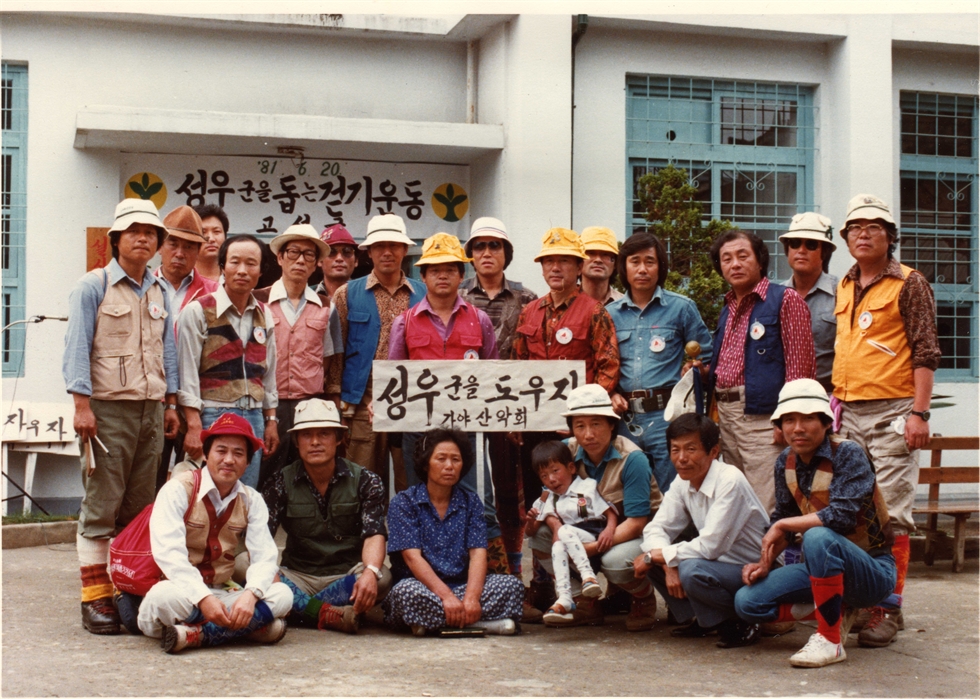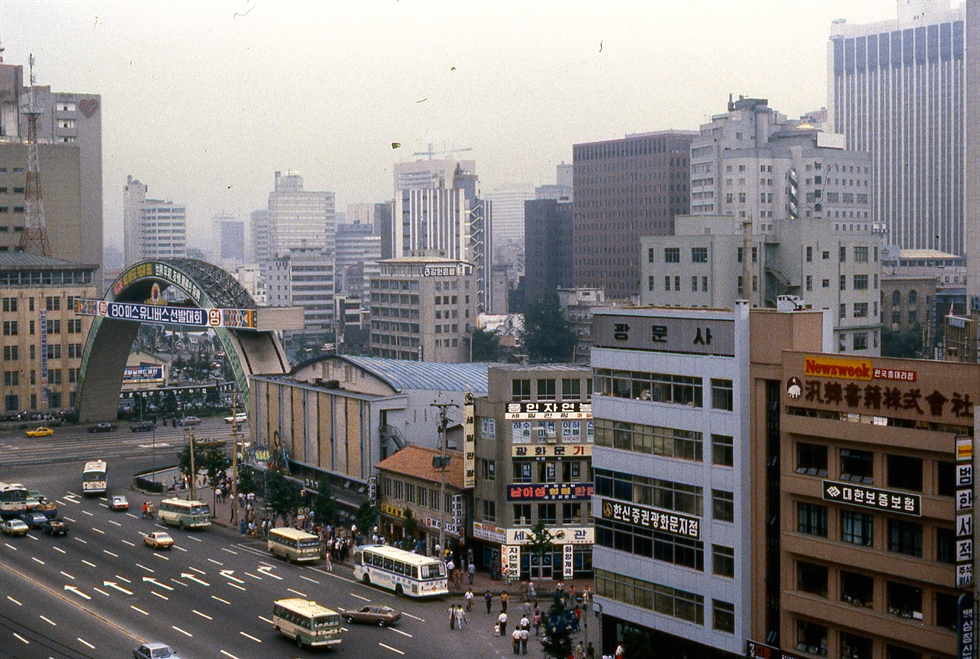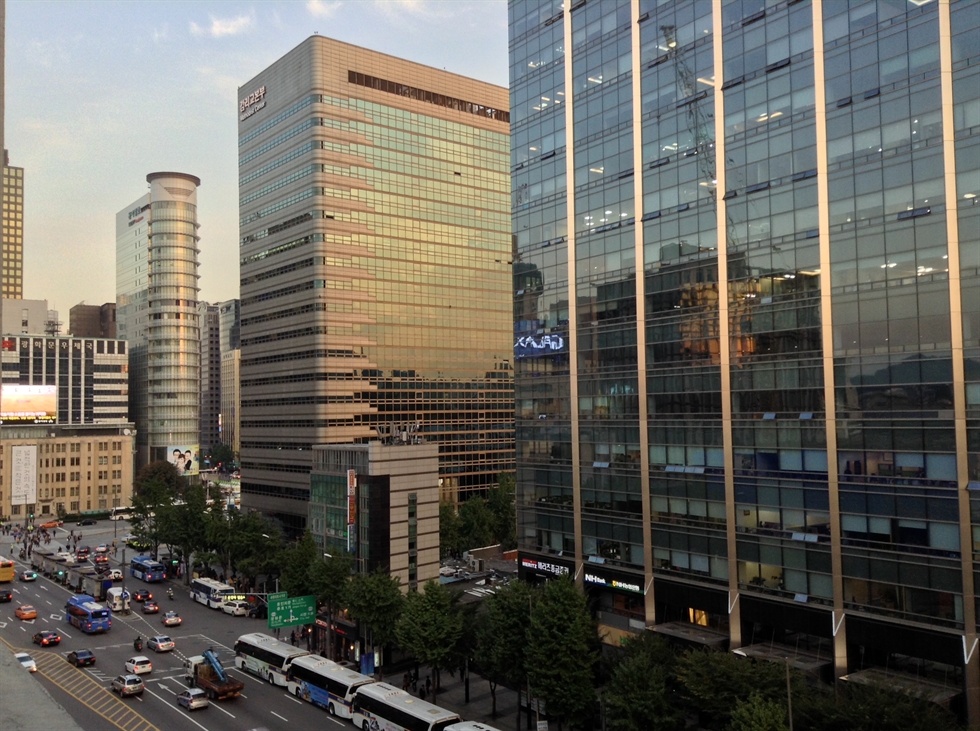Memories of serving as last Peace Corps/Korea Director
by James Mayer (Korea 1978-81)
The Korea Times
Friends of Korea

Peace Corps volunteers and others hold a walk-a-thon to raise funds for heart surgery in 1981. / Courtesy of Nancy Kelly
No one likes to be last. But I had that distinction as the Peace Corps Korea country director, and I am forever grateful that it happened. In early 1981, Peace Corps Headquarters made the difficult decision that the Peace Corps program in Korea had to be closed due to projected budget reductions to its worldwide programs.
When the Peace Corps Volunteers (PCVs) were told that their service in Korea would be cut short, I truly didn’t know what to expect. I told them there were two basic choices: they could choose to get angry or go out with heads held high. Frankly, I wouldn’t have blamed them for choosing either option. Nonetheless, I was truly delighted by their response.
Some PCVs chose to continue their service in other countries where Peace Corps had programs. Others immediately set about organizing a traveling Public Health Fair across Korea to help educate people living in rural areas about critical health topics like tuberculosis, maternal child healthcare, Hansen’s disease (leprosy) and other related topics affecting the population.
During this time the PCVs learned about a young boy who was in desperate need of a heart operation. A walk-a-thon in South Gyeongsang Province from Goseong to Tongyeong (then called Chungmu) was quickly organized by the PCVs hoping to raise money to pay for the operation. The efforts of these Volunteers far exceeded their goals for the walk-a-thon ― they raised enough money that not only paid for the young boy’s operation fully but raised more than enough money so that an additional four children would be given a chance for the lifesaving operation. These Volunteers, whose service was being cut short abruptly, also completed a comprehensive final report of Peace Corps service in Korea from 1966 to 1981.

Peace Corps volunteers and others hold a walk-a-thon to raise funds for heart surgery in 1981. / Courtesy of Nancy Kelly
Korea has a way of impacting one on a very deep and personal level ― it certainly did to me. There are so many wonderful memories washing over me as I am writing this column. I want to share two experiences that remain so vivid in my memory that it seems like yesterday.
I arrived in Korea in late November 1978. On my second day in the office, I noticed a young boy of about eight or nine years old walking around the office looking under desks. I couldn’t fathom what he was doing; it was only my second day, and no one seemed to give the boy notice, so I decided I didn’t need to care either. He also appeared in the dabang in the basement of our office building that I often visited (for newbies to Korea, a dabang is a coffee house ― they have mostly given way to Starbucks and Tom N Toms; they were wonderful hideaways one could visit for a terrific cup of coffee or tea and conversation with total strangers, a truly wonderful experience that is lost to a transformed society).
After a few days it became clear to me what the young boy was up to: he was looking for shoes. For 100 won, he would take your shoes to some hidden place, shine them to high gloss, and return them to their owners in a few hours, never forgetting whose shoes belonged to who.
Over time, I got to know the boy. He was an orphan living on the streets. Shining shoes for 100 won each was how he earned enough money for his daily food. There was something rather special about this boy. He had a smile that was infectious ― when you saw him, you simply had to smile back in return. He possessed an incredible amount of self-confidence. He wasn’t looking for a hand-out, only a hand-up. It wasn’t too long before I joined him as he wandered through our offices looking under desks in search of shoes needing attention. I helped him gather up the shoes (whether needing a shine or not). He didn’t speak English and I didn’t speak Korean ― it didn’t matter. Forty years later his smiling, often dirty face smudged with black polish is ever-present in my memories.

The view from the Peace Corps office in Seoul in the mid-1970s. Ilmin Museum of Art is visible on the left. / Courtesy of Gerald Krzic
Another deeply moving experience for me came about when I noticed a middle-aged woman huddled next to a charcoal heater in December selling flowers next to our office building. I would greet her with a smile every night when leaving my office. She was there every single day. I learned, in time, that she was a widow with two young daughters. The staff told me she had been selling flowers in that same spot for as long as anyone could remember. My home in Yeonhui-dong was never without flowers. The memory of those flowers and the woman who sold them to me is as vivid today as when I first met her. I later learned that her two daughters both graduated from universities.
These are two simple examples of how Korea impacted the very depth of my soul and left me with vivid memories that haven’t faded after 40 years.
I am blessed to have been the last Peace Corps Korea country director and the multiple experiences that opportunity gave me and other PCVs to have been immersed in the powerful richness of Korea and its culture.
•
James Mayer served as Peace Corps country director in Korea from 1978 to 1981 and is vice president of Friends of Korea. All proceeds from this column are donated to charities in Korea as part of the Friends of Korea Giving Back Initiative.


Jim—what a delight to read your narrative of PC/K’s last days. I always knew from our ACTION days that you were a good guy, but I did not know the depth of your sensitive “soul”. Thanks so much for helping the shoe shine boy and the flower lady–you helped change people’s lives.
When you have a moment give me a call (202 291 2218) or email: jchromy42 at gmail.com, and we can savor old stories together
Cheers John Chromy
[…] https://peacecorpsworldwide.org › memories-of-serving-as-last-peace-corps-Korea-director […]